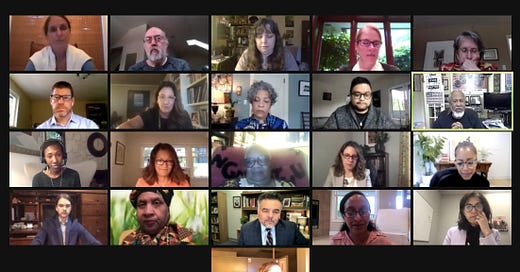Will you join me in telling our story? Vote now!
Affirming practices for mental health that center identity, community, and resiliency
This week I am asking you to join me in telling the story of our students, families, and communities. We are doing work that supports students’ mental health and wellness through racially affirming practices that center identity and community. It is time to celebrate our resiliency! Please click here and vote for our essay submission:
by Christine Pitts and Elizabeth Gilkey
As many of you know, I moved to the district level because I was inspired by the way I saw our leadership centering racial identity and justice. As we know, this work is not linear and there is not a finish line. It involves day-to-day and minute-to-minute consideration for the way that race shows up (or doesn’t show up) in our schools and system.
This week, in our local board meeting, I was reminded of how, when you take the time to listen, dialogue, and establish relational trust, our work to center Black resiliency, stories, humanity, love, culture, and excellence is rewarding for every single person in our city. For this reason I repeat these words almost every day in my current role and it warrants telling you all:
“My team and I have the true honor and privilege of documenting and elevating the lived experiences of our racially, ethnically, and linguistically diverse communities.”
But, “What does that really mean?” you might ask. You see, some people assume that the central role of research and evaluation is to uphold a rigid accountability system or collect a lot of standardized data to make elaborate models and predictions. But, in reality, that view does not accurately reflect my “why” and my “work”.
While you may catch me occasionally nerding out on a beautiful econometrics-meets-education journal article, I actually spend most of my time thinking deeply and working diligently to ensure data are working towards justice. I work across stakeholders to build the systems to ensure that data are in the hands of community advocates, they are actionable, and meaningful. I live in stories and voices emerging from homes, schools, and classrooms. I weave together narrative tapestries that we can wrap ourselves in when the work gets tough and when our students and families need a safety net.
Today, I am asking you to do this work with me.
For several years, the Thomas B. Fordham Institute has hosted an annual essay competition to generate substantive conversation around key issues in education research, policy, and innovation. This year, their essay competition is focused on crowd-sourcing ideas for addressing mental health needs as we come out of COVID disruptions without supplanting academic instruction. It was in clear alignment with our work in Portland to elevate the ways our community has centered mental health and wellness through racially, culturally, and linguistically affirming practices.
In our essay we write that, “it’s important… we not dump additional dollars into mental health supports that were lacking or fragmented pre-Covid,” and instead consider how we are centering and expanding the work of our culturally-specific community partners. Our analyses “implore us to continue to peel back the layers of identity, relational trust, and community as we make plans for providing additional mental health support services.” Today, voting opens for the Wonkathon and you can take part in this paradigm shift, the rebuilding, and the revolution that is happening in Portland and across the US right now.
Will you join me in telling our story? Please click here and VOTE for our essay Partnering with culturally-specific community organizations to provide consistent, expansive, and adaptive mental health services by Christine Pitts and Elizabeth Gilkey.
Dr. Christine M. T. Pitts is a transformative and visionary education policy leader. As an Oregonian, raised by a multicultural family of educators, she brings over a decade of progressive strategic leadership experience and analytic skill to crafting state education policy. An educator and researcher by training, she has conducted legislation, governance, and policy analyses on a wide array of education issues using social network analysis and mixed methods research. In addition, Dr. Pitts is a facilitative leader who deeply understands and co-constructs local and national partnerships across stakeholder groups. Dr. Pitts currently coordinates between state and national policy leaders to investigate and advocate for policies that prioritize racial equity in education. Christine lives with her husband and four children in Portland, Oregon. Follow her on Twitter @cmtpitts.






